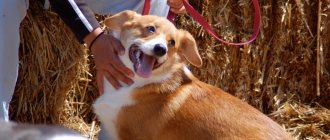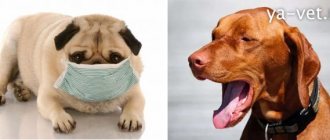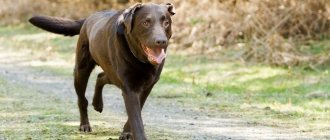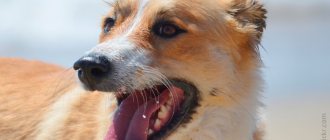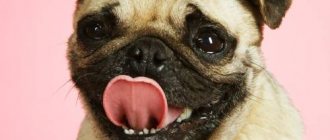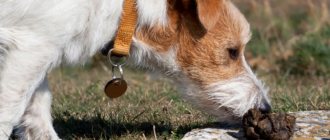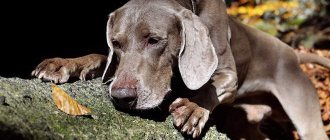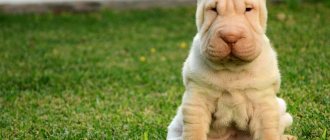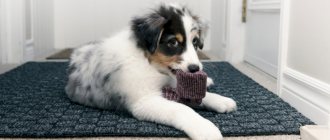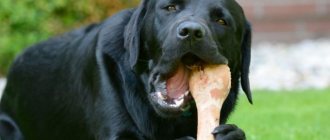Dog or cat - who is better? For many, this question does not arise, which is why a dog and a cat often live nearby. And often owners are faced with a problem - the dog eats cat excrement. Let's try to figure out what to do, how to fight, and what this means for the dog.
First of all, diseases should be excluded. If the dog refuses to eat, has lost weight, or is in a depressed general condition, it is necessary to contact a veterinarian. If the pet’s health does not cause concern, the reasons for such behavior should be sought elsewhere.
Teach your dog the "Leave it" command.
If your dog continues to interfere with your cat's privacy, it's time to teach them the "Leave it" command. Here's how you teach them this command:
Be very diligent about this. Every time you see your dog hanging around the cat potty, you know what they're up to. Speak to your dog in a firm tone and say, “Leave it!”
If she listens to you, give her a treat. If she doesn't listen, say it again, but louder. Dogs don't need to understand your vocabulary; they can feel your command.
This may not work the first few times because it is a new command for your dog. Just keep repeating it.
General recommendations
A muzzle will prevent your dog from eating feces on the street.
When retraining a pet, some dog breeders make mistakes. To do everything right, you must follow the following recommendations:
- you can’t beat a dog - this will not help rehabilitate it, but will only aggravate the situation;
- it is necessary to walk with the dog every day and play with it;
- There is no need to give your pet any pills without a doctor’s prescription;
- You shouldn’t poke the dog into a pile - this will not help the dog understand what exactly he did wrong.
Important! When walking, your dog must be muzzled to prevent him from eating feces on the street.
Use fences to keep them out
Interior fences outside the cat's room can prevent dogs from accessing that space. There are a number of interior fencing available online. Find the right size and height for your dog.
When purchasing them, make sure the space between the bars is wide enough for cats to pass through, but narrow enough to be in the way for dogs.
In contrast, you can install a small door in the bathroom door so that your kitties have access to the bathroom but not your dogs.
© shutterstock
The appearance of digestive problems
We have found that digestive problems can occur due to a lack of enzymes. There are two main mechanisms by which the body lacks pancreatic enzymes. In the first option, the problem with the production of enzymes lies in the pancreas itself, i.e. the organ itself is not functioning properly.
Impairment of the pancreas can be a congenital problem or acquired, for example, after surgical interventions. As a rule, such a mechanism underlies serious diseases of the gastrointestinal tract (GIT), the symptoms of which will sooner or later lead to an appointment with a doctor8.
In the second option, the conditions under which enzymes can work correctly are violated. This is possible as a result of changes in the acidity of the intestinal environment, for example, due to inflammation or a change in the standard ambient temperature (36-37 ° C). The inflammatory process in the intestines can occur under various conditions: intestinal infections, allergic reactions (food allergies, atopic dermatitis).
Buy stool repellers
Another way to prevent your dog from eating poop is to use a stool soothing product. They are specially made for dogs who cannot stop eating cat or other feces.
You don't want to kiss your dog once he has perverted his mouth. So, investing in stool repellents will be beneficial for you and your dog, as some products have "breath fresh" features to freshen the mouth.
On the other hand, stool repellents designed for cats may make their stool unattractive to dogs so they can stay away.
What do we have to do
Many people are interested in what can be done to stop their dog from eating feces. There are several ways to solve this problem.
Rule out diseases
A veterinarian is a specialist who will help identify diseases in your dog.
First, you need to make sure that the dog is completely healthy and is not sick. To do this, your pet will have to be taken to a veterinarian. He will conduct examinations and, if necessary, prescribe effective treatment. To find out the diagnosis, you will have to perform the following procedures:
- fecal analysis, which will allow you to find out information about the quality of food digestion and make sure that the dog does not have worms;
- blood analysis;
- Ultrasound of the abdomen.
Important! Only after excluding pathologies can you begin to correct the dog’s behavior.
Change your diet
If the dog is healthy, then you need to make sure that it has a balanced diet. In this case, you will also have to consult a veterinarian so that he can help you create the correct diet.
Most often, doctors recommend giving dogs food that contains a lot of protein and vitamins. Additionally, vitamin complexes and beef tripe may be prescribed, which promotes the digestion of fiber.
Ignore
One of the most effective methods for correcting coprophagia is ignoring the dog. This method will help if the dog eats feces to attract attention. She will realize that it doesn't really work and will eventually stop doing it.
Blame
Some experienced dog breeders recommend weaning the dog with the help of reprimands and the use of prohibition commands. If a dog is seen eating cat feces or its own feces, you should immediately approach it and start swearing. At the same time, you can clap your hands loudly or hit the table with something so that the pet begins to feel guilty.
Important! You shouldn’t read morals for a long time, as the dog may perceive them as encouragement. It is enough to say one word loudly.
Distract
Toys are the best way to distract a dog.
Everything must be done to ensure that the pet does not get bored and is not left at home alone. To keep your beloved dog constantly busy, you need to do the following:
- call the dog to you and give it something tasty as soon as it starts to approach the feces;
- frequently engage in training and active games;
- give your dog more toys to spend time with;
- take your pet for walks in the fresh air more often.
Change the taste of stool
There is one trick with which you can quickly wean your dog from eating feces - changing its taste and smell. You can change the taste of stool as follows:
- treating feces with hot pepper;
- adding monosodium glutamate, which changes the taste of poop;
- treating cat feces with a special spray.
Maintain order
It is necessary to maintain order in the apartment and promptly remove cat feces. This will prevent the dogs from having the opportunity to taste them.
Make unavailable
It is recommended to install the cat litter in places that are inaccessible to the dog. For example, they can be placed on low elevations. You can also use special toilets with a door that only cats can enter.
Give your dogs the right nutrition
Your dogs most likely become interested in cat poop through the nutritional value it provides. This happens because your dogs are not getting enough food from their current diet.
If so, it's time to change your dog food. Check the ingredients listed on the back of the package to determine which ingredients your dogs need most. Your veterinarian can help you figure this out.
When changing your dog's food, make sure you distribute the food correctly on a daily basis. You can give them human food, but only with your veterinarian's permission.
Is this dangerous for health?
Many dog owners are interested in the health risks that cat feces can cause. In fact, the excrement of healthy domestic cats cannot harm dogs and is therefore absolutely safe. However, despite this, you must try to wean your pet from doing this. Especially if the owner finds it difficult to come to terms with such an unusual habit of the dog.
Additional Information! Cat feces can only be safe if the cat lives at home and does not spend much time outside.
If this is a street cat, then its excrement can harm the dog’s health. They will probably contain various parasites that will enter the dog’s body.
Symptoms requiring immediate medical attention
Chronic intestinal diseases, such as diverticular disease, ulcerative colitis, Crohn's disease, polyps, if prolonged without proper treatment, can lead to life-threatening complications and cancer.
According to clinical guidelines, there are “alarm symptoms” or “red flag symptoms” that require an urgent visit to a doctor:
- unmotivated weight loss;
- diarrhea or abdominal pain at night;
- constant severe abdominal pain;
- onset of symptoms in old age;
- the appearance of mucus and blood in the stool;
- diarrhea lasting more than two weeks;
- episodes of constipation repeated within 2 months;
- blood relatives with inflammatory bowel disease or colon cancer.
Normal or pathological?
Experts do not consider this animal behavior to be a deviation from the norm. It's not just dogs who eat the excrement of their young. This is why coprophagia occurs more often in females than in males. In the wild, this is justified: in this way the female hides her tracks so that predators cannot find the babies. Ancient innate instincts can awaken in a dog of any breed, even one bred in recent years.
But our animals have been living in warm apartments and houses for a long time, and the instinct to protect their offspring has been preserved. While watching its mother, a small puppy may also eat feces, which, according to some animal psychologists, remind puppies of their first food - warm, semi-solid and semi-digested. Tigresses and lionesses eat this food for their cubs, regurgitating it for them after the hunt.
On the street, puppies watch their friends and relatives and can copy their behavior. Watching playground mates eat feces may cause your puppy to do the same.
Experts distinguish three types of coprophagia:
- autocoprophagy - eating one's own feces;
- intraspecific - eating only dog droppings;
- interspecific - eating the feces of other animals - cats, deer, cows, etc.
Treatment and method of delivery
Pregnancy imposes special features on the development of infection, due to the reduced functioning of the immune defense. Therefore, when an infection is diagnosed, active measures are needed to treat it. And its basis is antibiotic therapy, the drugs of choice are the group of macrolides. In some cases, antimalarial drugs are used. However, such treatment has many side effects, and only a doctor can prescribe medications, individually determining the duration of treatment and dosage.
If we talk about childbirth, infection with toxoplasmosis is not an indication for cesarean section. It can only be performed if there are specific indications from the mother or fetus. But, in most cases, childbirth occurs naturally.
Symptoms of toxoplasmosis
The infection is very dangerous and insidious, because, most often, it occurs without specific symptoms. A woman sometimes does not even suspect the presence of a dangerous pathogen, which can negatively affect the course of pregnancy and cause irreversible consequences.
In acute toxoplasmosis, body temperature rises to 38.5-39º C, cold symptoms are noted: weakness, aching joints, general malaise. Most often, women do not take active measures to treat and prevent consequences. To make a diagnosis of toxoplasmosis, an additional examination is required - determination of immunoglobulin class M and G.
Prevention of gastrointestinal diseases
Preventing the development of gastrointestinal diseases is not so difficult. It is enough to adhere to simple principles of a healthy lifestyle. Here are a few rules to follow in the prevention of gastrointestinal diseases: 2
take care of proper and balanced nutrition; prefer fresh vegetables and fruits to canned food, fast food and high-calorie foods; stop smoking and drinking strong alcohol; exercise regularly and maintain an active lifestyle; undergo periodic preventive examinations; If you notice the first symptoms of digestive system disorders, consult a doctor immediately.
The danger of this habit
If a dog eats feces, then this habit should be eradicated quickly, since it can cause a serious illness for the animal. By eating feces, pets are at risk of infection:
- helminths - intestinal parasites that, if untreated, affect internal organs, and in large quantities can lead to their blockage and rupture;
- parovirus enteritis - a deadly viral infection that affects the digestive organs, to which young animals are more susceptible;
- toxoplasmosis - a serious disease transmitted to humans, with a possible fatal outcome for dogs, especially those over 7 years of age;
- leptospirosis - a disease that affects the liver and often leads to rapid death (most often if the individual is young or elderly);
- Hepatitis is a life-threatening disease. It is important that this infection can exist for a long time in the environment, including in animal feces.
Some tips for owners
You can help the young mother with cleaning the den and pack the litter box for the puppies in a timely manner, then she will not have to clean up after them by eating excrement.
Analyze your pet’s diet and feed it a more varied diet; if it eats only dry food, introduce additional jelly complementary foods and vitamins, and give “natural” foods, for example, meat.

